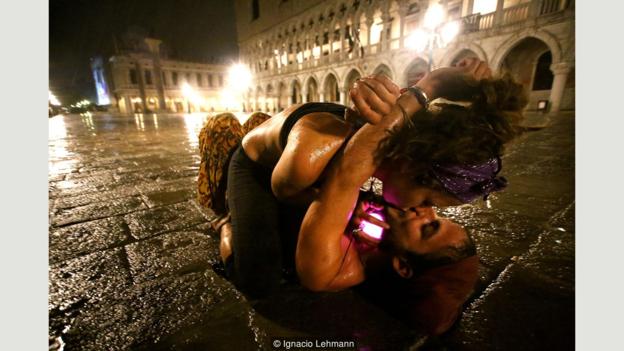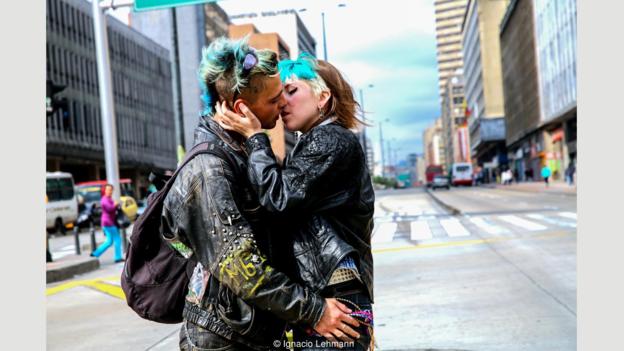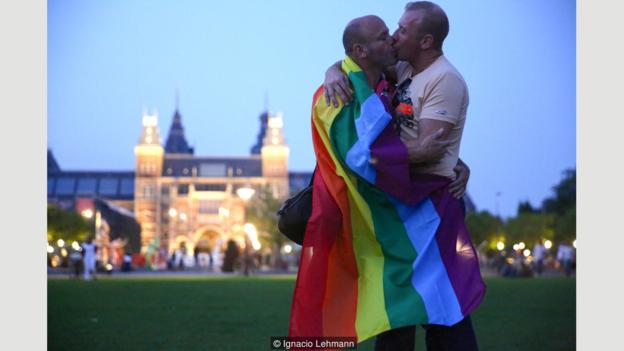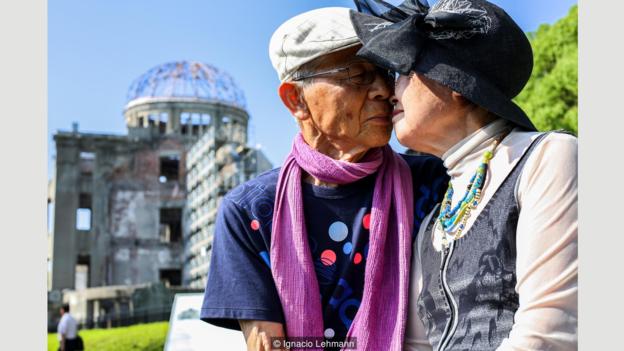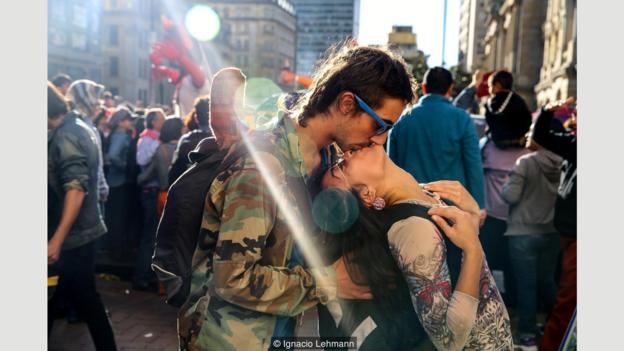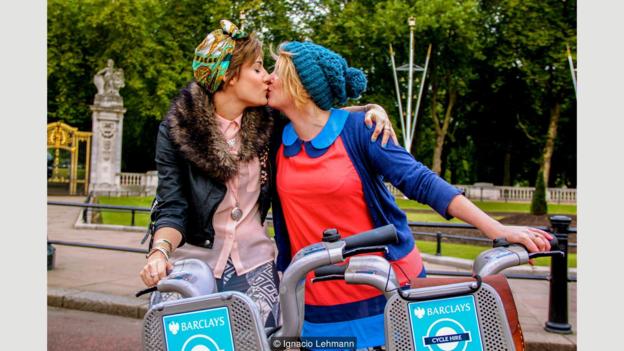‘I am gay — but I wasn’t born this way
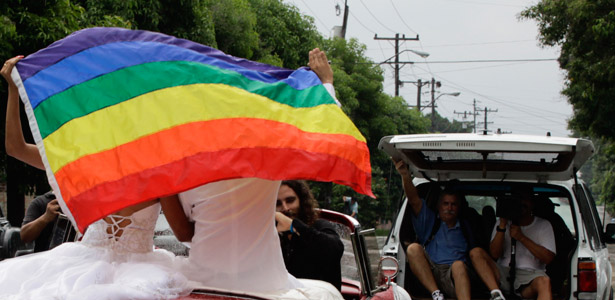
Is sexuality purely the result of our biology? Brandon Ambrosino argues that simplistic explanations have ignored the fluid, shape-shifting nature of our desires.
“You can’t be gay.”
She was on top of me.
It wasn’t a command — it was a challenge. You so obviously cannot be gay, was her implication, because this is good sex.
It was 2006, a full five years before Lady Gaga would set the Born This Way argument atop its unassailable cultural perch, but even then the popular understanding of orientation was that it was something you were born with, something you couldn’t change. If you happened to engage in activity that ran counter to your sexual identity, then you had two options: you were lying to yourself and everyone else, or you were just experimenting.
The sexual categories were rigid. Fixed. They weren’t subject to human imagination or experimentation – to the frustration of many sociologists, and kids, like myself, who found themselves inexplicably in bed with a player from the other team.
My sexual journey through college was anything but run-of-the-mill. I came out at a conservative Christian college in the US and was in a gay relationship for around two years with a basketball player who ended up marrying a woman. During that time, we both pal’d around with girls on the side. I even went so far as to fall in love with one. To this day, she and I joke about how she was the only girl I was ever in love with, and how I would’ve been quite happy marrying her.
As a writer, this kind of complicated story is incredibly interesting to me – mostly because it shows that my own personal history resists the kind of easy classifications that have come to dominate discussions of sexuality. Well, you must have been gay the whole time, some might think, and because of some religious shame, you decided to lie to yourself and experiment with a girl. But that was nothing more than a blip in the road. After all, most kids experiment with heterosexuality in college, don’t they?
If so, that ‘blip in the road’ has always been a thorn in my flesh. How do I explain that I was honestly in love with a woman? Some people might argue that I am innately bisexual, with the capacity to love both women and men. But that doesn’t feel like an accurate description of my sexual history, either.
I’m only speaking for myself here. But what feels most accurate to say is that I’m gay – but I wasn’t born this way.
In 1977, just over 10% of Americans thought gayness was something you were born with, according to Gallup. That number has steadily risen over time and is currently somewhere between 42% and 50%, depending on the poll. Throughout the same period, the number of Americans who believe homosexuality is “due to someone’s upbringing/environment” fell from just under 60% to 37%.
These ideas reached critical mass in pop culture, first with Lady Gaga’s 2011 Born This Way and one year later with Macklemore’s Same Love, the chorus of which has a gay person singing “I can’t change even if I tried, even if I wanted to.” Videos started circulating on the internet featuring gay people asking straight people “when they chose to be straight.” Around the same time, the Human Rights Campaign declared unequivocally that “Being gay is not a choice,” and to claim that it is “gives unwarranted credence to roundly disproven practices such as conversion or reparative therapy.”
People who challenge the Born This Way narrative are often cast as homophobic, and their thinking is considered backward
As Jane Ward notes in Not Gay: Sex Between Straight White Men, what’s interesting about many of these claims is how transparent their speakers are with their political motivations. “Such statements,” she writes, “infuse biological accounts with an obligatory and nearly coercive force, suggesting that anyone who describes homosexual desire as a choice or social construction is playing into the hands of the enemy.” People who challenge the Born This Way narrative are often cast as homophobic, and their thinking is considered backward – even if they are themselves gay.
Take, for example, Cynthia Nixon of Sex and The City fame. In a 2012 interview with New York Times Magazine, the actress casually mentioned that homosexuality was, for her, a choice. “I understand that for many people it’s not, but for me it’s a choice, and you don’t get to define my gayness for me.”
The blogger John Aravosis was one of many critics who pounced on Nixon. “Every religious right hatemonger is now going to quote this woman every single time they want to deny us our civil rights.” Aravosis leveled the same accusations against me in 2014 when I wrote a piece for The New Republic discussing my own complicated sexual history. Calling me “idiotic” and “patently absurd”, Aravosis wrote, “The gay haters at the religious right couldn’t have written it any better.”
For Aravosis, and many gay activists like him, the public will only accept and affirm gay people if they think they were born gay. And yet the available research does not support this view. Patrick Grzanka, Assistant Professor of Psychology at University of Tennessee, for instance, has shown that some people who believe that homosexuality is innate still hold negative views of gays. In fact, the homophobic and non-homophobic respondents he studied shared similar levels of belief in a Born This Way ideology.
As Samantha Allen notes at The Daily Beast, the growing public support for gays and lesbians has grown out of proportion with the rise in the number of people who believe homosexuality is fixed at birth; it would be unlikely that this small change in opinion could explain the spike in support for gay marriage, for instance. Instead, she suggests it hinges on the fact that far more people are now personally acquainted with someone who is gay. In 1985, only 24% of American respondents said they had a gay friend, relative or co-worker — in 2013, that number was at 75%. “It doesn’t seem to matter as much whether or not people believe that gay people are born that way as it does that they simply know someone who is currently gay,” Allen concludes.
In spite of these studies, those who push against Born This Way narratives have been heavily criticised by gay activists. “They tell me my own homo-negativity is being manifested in my work,” says Grzanka. Similarly, Ward has received her own hatemail for pushing against the ruling LGB narratives, with some gays telling her she’s “worse than Ann Coulter,” the controversial US author of books like If Democrats Had Any Brains, They’d Be Republicans. And when I published my essay on choosing to be gay, an irate American lesbian activist wrote me that it had “just been confirmed” to her that my writing was “directly responsible for four gay deaths in Russia.”
While I can understand why some contemporary activists (and the journalists who seem beholden to their agendas) might chalk up recent gains in LGB acceptance to Born This Way’s cultural infiltration, activism must be founded upon facts and truths, or the whole program will eventually turn out to be a sham. Drowning out every voice that dares to question dominant cultural narratives is not the same thing as invalidating the arguments those voices are making.
As Ward says, “Just because an argument is politically expedient doesn’t make it true.”
So what does the science say about Born This Way?
There is a unanimous opinion that gay “conversion therapy” should be rejected
Let’s first be clear that whatever the origins of our sexual orientation, there is a unanimous opinion that gay “conversion therapy” should be rejected. These efforts are potentially harmful, according to the APA, “because they present the view that the sexual orientation of lesbian, gay and bisexual youth is a mental illness of disorder, and they often frame the inability to change one’s sexual orientation as a personal and moral failure.” Little wonder these therapies have been shown to provoke anxiety, depression and even suicide.
In other words, the question of the efficacy of conversion therapies is a non-issue. We condemn these efforts not just because we don’t think they work — perhaps anyone could be tortured into liking or disliking anything? — but because they’re immoral.
The question of what leads to homosexuality in the first place, however, is obscure, even to the experts. The APA, for example, while noting that most people experience little to no choice over their orientations, says this of homosexuality’s origins:
“Although much research has examined the possible genetic, hormonal, developmental, social and cultural influences on sexual orientation, no findings have emerged that permit scientists to conclude that sexual orientation is determined by any particular factor or factors.”
Similarly, the American Psychiatric Association writes in a 2013 statement that while the causes of heterosexuality and homosexuality are currently unknown, they are likely “multifactorial including biological and behavioral roots which may vary between different individuals and may even vary over time.”
True, various eye-grabbing headlines over the years have claimed that some scientists have found something like The Gay Gene. In 1991, for example, neuroscientist Simon LaVey published findings that he claimed suggest that “sexual orientation has a biological substrate.” According to LeVay’s research, a specific part of the brain, the third interstitial nucleus of the anterior hypothalamus (INAH-3), is smaller in homosexual men than it is in heterosexual men.
You can spot the problem with this study a mile away: were the gay brains LeVay studied born that way, or did they become that way? LeVay himself pointed this out to Discover Magazine in 1994: “Since I looked at adult brains, we don't know if the differences I found were there at birth or if they appeared later.” Further, the brains LeVay studied belonged to AIDS victims, so he couldn’t even be sure if what he was seeing had something to do with the disease.
Another landmark paper on the origins of homosexuality was published in 1993 by a geneticist named Dean Hamer, who was interested to learn whether homosexuality could be inherited. Beginning from his observation that there are more gay relatives on a mother’s side than a father’s, Hamer turned his attention to the X chromosome (which is passed on by the mother). He then recruited 40 pairs of gay brothers and got to work. What he found was that 33 of those brothers shared matching DNA in the Xq28, a region in the X chromosome. Hamer’s conclusion? He believes there’s about “99.5% certainty that there is a gene (or genes) in this area of the X chromosome that predisposes a male to become a heterosexual.”
A 2015 study sought to confirm Hamer’s findings, this time with a much larger sample: 409 pairs of gay brothers. Researchers were pleased with their findings, which they claimed “support the existence of genes on… Xq28 influencing development of male sexual orientation.”
But not everyone finds the results convincing, according to Science. For one thing, the study relied on a technique called genetic linkage, which has been widely replaced by genome-wide association studies. It’s also noteworthy that Sanders himself urged his study to be viewed with a certain caution. “We don’t think genetics is the whole story,” he said. “It’s not.”
And as Allen points out, there have also been studies that found no “X-linked gene underlying male homosexuality.” Perhaps predictably, these studies haven’t received as much media coverage.
Besides the individual critiques leveled against each new study announcing some gay gene discovery, there are major methodological criticisms to make about the entire enterprise in general, as Grzanka points out: “If we look at the ravenous pursuit, particularly among American scientists, to find a gay gene, what we see is that the conclusion has already been arrived at. All science is doing is waiting to find the proof.”
The other problem with Born This Way science is summed up nicely by Simon Copland: “Scientists are asking whether homosexuality is natural when we can’t even agree exactly what homosexuality is.”
Grzanka agrees. “If you know anything about social constructionism, then you know these sexual categories are very recent. How then could they be rooted in our genome?” Our desires may express themselves in many different ways that do not all conform to existing notions of ‘gay’, ‘straight’ or ‘bisexual’.
This is one of the best takeaways of Ward’s Not Gay, a penetrating analysis of sex between straight white men. Gay men make up only a fraction of the US population — yet Ward says that there are many men not included in that number who engage in homosexual behavior. Why, then, do some men who have sex with men identify as gay, and others identify as heterosexual? This question interests her far more than ‘how were they born?’.
Ward stresses that not all straight-identifying men who have sex with men are bisexual or closeted, and we do a disservice if we force those words on them. That’s because terms like ‘heterosexual’ and ‘straight’ and ‘bisexual’ and ‘gay’ come with all sorts of cultural baggage attached. Crucially, she argues, “whether or not this baggage is appealing is a separate matter altogether from the appeal of homosexual or heterosexual sex.”
Even if you accept that sexual desire may exist on a kind of spectrum, the predominant idea is still that these desires are innate and immutable – but this runs counter to what we know about human taste, says Ward. “Our desires are oriented and re-oriented based on our experiences throughout our lives.”
In fact, the straight-identified men Ward studied for her book sometimes found themselves in situations that sparked the desire for homosexual sex: fraternities, deployments, public restrooms, etc. But Ward doesn’t conclude these are somehow repressed or latent gay men. Rather, she argues that they — like all of us — have come to desire bodies and genitals within specific social contexts pregnant with “significant cultural and erotically charged meanings.” In other words, what they want isn’t the “raw fact” of a man’s body, but what it represents in a certain context.
Why might we be uncomfortable asking whether and how much control we each possess over our “full range of erotic possibilities,” as Ward calls it? “What would it mean to think about people’s capacity to cultivate their own sexual desires, in the same way we might cultivate a taste for food?” she asks. Ward thinks this question is the next frontier of queer thought.
When I first said I chose to be gay, a queer American journalist challenged me to name the time and date of my choice. But this is an absurd way to look at desire. You might as well ask someone to name the exact moment they began liking Chaucer or disliking Hemingway. When did I begin to prefer lilies to roses? What time did the clock read at the exact moment I fell in love with my partner? All of our desires are continually being shaped throughout our lives, in the very specific contexts in which we discover and rehearse them.
I’m claiming that at some point during college, my sexual and romantic desires became reoriented toward men
Thinking back to my college romances with women and men, I can begin to understand how my own experiences might have helped me to ‘cultivate’ my desire for homosexuality. I want to be very clear: I’m not claiming I simply began to ‘grow into’ my homosexuality, or that as I became more comfortable with being gay, I allowed myself the freedom to express what had always been latent within me. I’m claiming that at some point during college, my sexual and romantic desires became reoriented toward men. These desires suggested to me a queer identity, which I at first reluctantly accepted and then passionately embraced. This new identity in turn helped reinforce and grow new gay desires within me.
Granted, none of this means that there were no genetic or prenatal factors that went into the construction of my or any other sexual orientation. It just means that even if those factors exist, many more factors do too. So why not encourage conversations about those other things?
Humans aren’t who and what we are because of one gene
Humans aren’t who and what we are because of one gene. We’re who and what we are for a variety of reasons, and some of it might have something to do with how our genes randomly interact with our environments. But that’s not the whole story, and to engage in discourse that pretends it is — regardless of the nobility of the intentions — could have “profound and very negative consequences” for the LGBT community, says Grzanka.
“Limiting our understanding of any complex human experience is always going to be worse than allowing it to be complicated,” he says.
So what are we to do with the Born This Way rhetoric? I would suggest that it’s time to build a more nuanced argument — regardless of how good a pop song the current one makes.
There are several reasons for this. Firstly, and most importantly, it’s just not the truth, as we currently understand it. The evidence to date offers no consensus that the Born This Way argument is the beginning and end of the story. We should stop pretending that it does.
Secondly, the entire search for a gay gene is predicated upon the assumption that homosexuality is not the natural or ‘default’ state of a developing human. ‘Something had to happen to make that man gay!’
But why cede such enormous ground to those who believe something has ‘gone wrong’ inside gay bodies and brains? For that matter, why play their game and pretend the only forms of difference that deserve justice are those we were born with? “That’s a very narrow understanding of what justice looks like,” says Ward.
What about the concern that homophobes will want to ‘encourage’ gay people to be straight if there’s no biological basis for sexuality? Let’s turn it around. Is it not equally true that ‘finding a gay gene’ might inspire the same homophobes to ‘find a cure’ for homosexuals? It doesn’t take too much creativity to imagine a scenario in which homophobic parents, upon being informed their fetus has ‘the gay gene’, choose what to them may seem the lesser of two evils: abortion.
Finally, I would argue that the Born This Way narrative can actively damage our perceptions of ourselves. In my sophomore year of college, I attended a Gay Student Alliance event at a nearby campus. It was the last meeting before Thanksgiving break, and the theme was coming out to your families. The idea was that the students would rehearse the coming out speech that they’d deliver while they were home.
Student after student, while sobbing hysterically, said something like this: “Mom, you see how much pain this is causing me! Of course, I’d want to be straight if it were up to me. This is just who I am! You have to accept that because I can’t change that.”
I wanted to grab each of them and say, “Being gay is not a handicap. It’s OK to be queer even if you choose to be queer — and you should want to be queer! Because we are beautiful and fabulous.”
Ward sees this as a self-hating narrative. “Could you imagine if the dominant narrative of people of color was, ‘Well, of course I’d want to be white if I could. Wouldn’t everyone want to be white?’ That’s so racist! We’d never accept that story.”
Perhaps it is time to look to the beginning of the gay rights movement. “Queer Nation and earlier movements in the US were not fundamentally organized around Born This Way explanations,” says Grzanka. “They were organized around sexual liberation, and the radical notion of challenging heteronormativity.”
Gay and lesbian activists, says Ward, used to draw on religion parallels to argue for inclusion. “People aren’t born with their religions. They’re born into religious cultures, and they can convert if they’d like. But there are still legal protections for them.”
Eventually activists decided that argument wasn’t working fast enough, particularly in the shadow of the AIDS epidemic. “Then there was a shift, and the leaders of the movement chose to jump on board with a less nuanced argument that people already understood: just like race, people are born with their homosexuality.”
Fortunately, we have now made enormous strides in understanding and affirming our queer sexualities. Some experts have even started using categories like ‘mostly straight’ and ‘mostly gay’ to try and expand our limited ways of viewing human sexuality. A recent UK poll from J. Walter Thompson Innovation group found that only 48% of Generation Z (ages 18-24) identify as “100% heterosexual.” Respondents were asked to rate themselves on a scale from zero (which signified “completely straight”) to six (“completely homosexual”). More than a third chose a number between one and five.
In response to the poll, one of my Facebook friends quipped about how natural selection must be working in overtime, what with making all of us gay! Indeed, as Ward notes, the Generation Z findings don’t signal some evolutionary shift over the last 15 years. Rather, they show that the times — the ‘nurture’ part of the nature/nurture dichotomy — are changing. Homosexuality isn’t considered taboo. Heterosexuality isn’t (always) considered the compulsory norm. And importantly, each isn’t always constructed in opposition to the other.
I’m thankful for a new generation that is capable of imagining sexuality in a way that transcends the gay/straight binary, that couldn’t care less about what happened to their bodies and minds to make them who they are today. I’m hopeful that for this generation, sexual histories like mine and Cynthia Nixon’s aren’t seen as threatening, but liberating.
I don’t think I was born gay. I don’t think I was born straight. I was born the way all of us are born: as a human being with a seemingly infinite capacity to announce myself, to re-announce myself, to try on new identities like spring raincoats, to play with limiting categories, to challenge them and topple them, to cultivate my tastes and preferences, and, most importantly, to love and to receive love.
Политика конфиденциальности | Правила пользования сайтом
